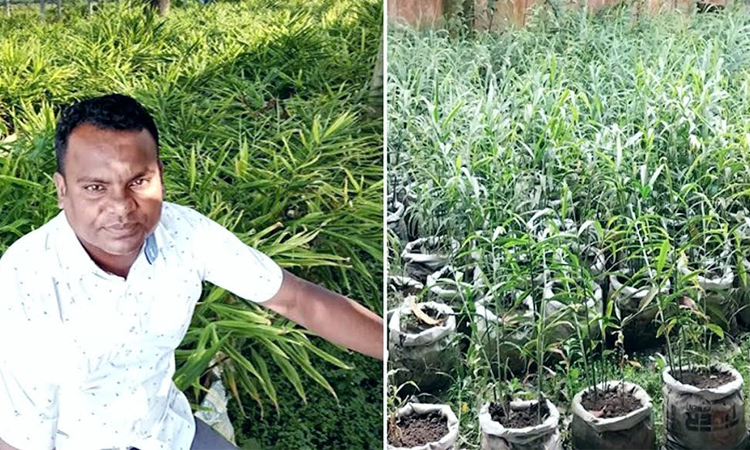News Flash

By Md Mamun Islam
RANGPUR, Aug 18, 2025 (BSS) - Young entrepreneur Md Shahinul Islam Bakul has
revolutionized the highly profitable cultivation of ginger in sacks at his
Haribhanga mango orchard in Moyenpur village of Mithapukur upazila of the
district.
After making a remarkable profit by producing 78 maunds (one maund per 40 kg)
of ginger from 12,500 sacks last year, 32-year-old Bakul has grown 16,000
sacks of ginger as an additional companion crop in his Haribhanga mango
orchard this time.
Inspired by Bakul's success in cultivating Bari-2 and Thai varieties of
ginger, 152 families living in his Moyenpur village have cultivated the same
variety of ginger in 10 bags each this season with his assistance.
Bakul firmly believes that by cultivating ginger in bags, the country can
achieve self-sufficiency in ginger production, which can save a huge amount
of foreign exchange from ginger imports every year.
After completing his postgraduate course in Bengali literature at Begum
Rokeya University in 2015, Bakul, son of farmer Md Asab Uddin never kept him
busy in looking for a good job.
He is the youngest among the three sons and four daughters of his farmer
father Asab Uddin and mother Hamida Begum, a housewife.
Bakul married his classmate Mukta Khatun, a student of the same department at
Begum Rokeya University, in 2016, a year after they completed their studies.
The happy couple has two sons and a daughter. They are Al Mahir, 6, and twins
Subana Islam, 3, and Al Mobin, 3.
Mukta, now a primary school teacher, helps Bakul in all respects, including
seed, fertiliser and irrigation management, accounts keeping, making payments
to their daily farm labourers, in running his initiatives.
Talking to BSS, Bakul said, he first started a dairy farm after completing
education, and then launched a duck farm and achieved laudable success.
Later, Bakul started cultivating Haribhanga mango and achieved huge success
over the past few years. At one stage, he thought to use the fallow land in
Haribhanga mango orchard and cultivate ginger there in sacs.
When he expressed desire to cultivate ginger in Haribhanga mango orchard,
Deputy Director of Burirhat Horticulture Center of the Department of
Agricultural Extension in Rangpur Dr Md Abu Sayem came forward to assist him.
"I got all necessary assistance, including sacs, fertilisers, seeds and
technical knowledge for cultivating ginger in sacs in my Haribhanga mango
orchard last season," Bakul said.
When Bakul started cultivating ginger in 500 sacs in the exhibition plot and
in more 12,000 sacs on his 50 decimals of land in the Haribhanga mango
orchard last year, local people were attracted and they also started farming
the same in sacs.
Inspired by last season's success, Bakul has cultivated 16,000 bags of ginger
this season, and with his help, 152 families in Moyenpur village have
cultivated 1,520 bags of ginger in their homesteads and fallow lands.
He said, "If modern storage facilities, such as cold storage, are set up and
all the land in the Haribhanga mango orchards and homesteads is brought under
the umbrella of ginger cultivation, then it is possible to achieve self-
sufficiency in our own ginger production."
Talking to BSS, Burirhat Horticulture Center Deputy Director Dr Md Abu Sayem
said that Shahinul Islam Bakul has achieved iconic success as a young
agricultural entrepreneur in the district.
There are around 4,000 hectares of homesteads and fallow lands, including
Haribhanga mango orchards on 1,910 hectares of land in Rangpur district
alone.
"If all these 4,000 hectares of land, including the Haribhanga mango
orchards, are brought under ginger farming in sacs, about 60,000 tonnes of
ginger could be produced in Rangpur district alone annually," he said.
Similarly, ginger production can be increased manifold by expanding ginger
cultivation in bags in all mango orchards and char areas of Rangpur division,
so that its demand can be met and a huge amount of foreign exchange spent on
imports can be saved every year.
"However, adequate storage facilities should be set up so that farmers can
easily store their produced ginger so that they can get good prices and
ensure smooth supply of their stored ginger throughout the year," Dr Sayem
suggested.